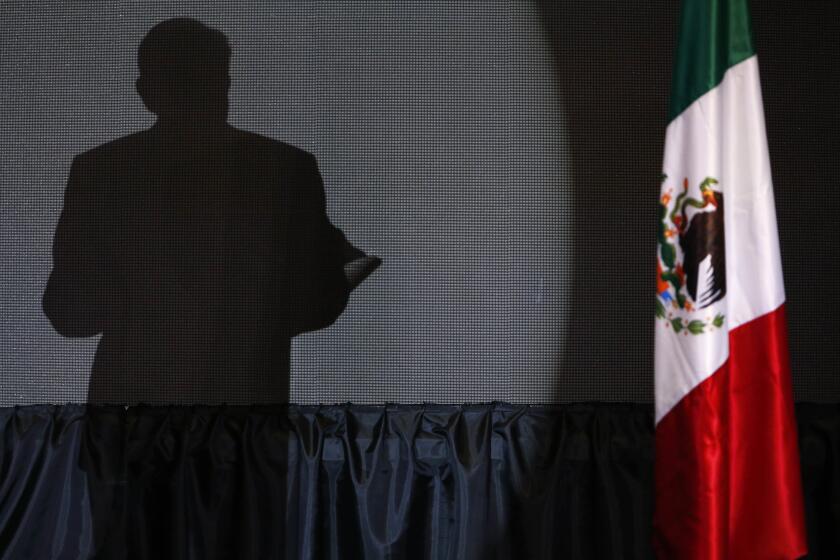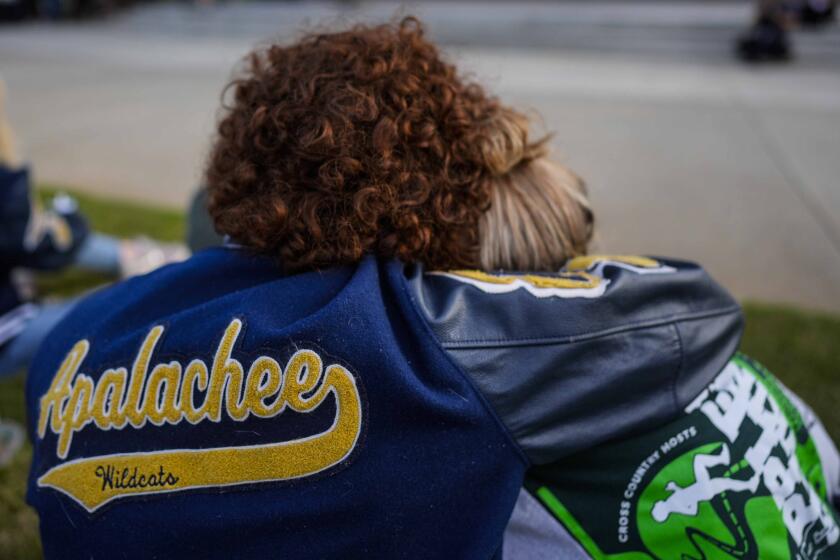Afghans Get Out the Ballots as Militants Keep Up the Offensive
Election workers Wednesday were mobilizing a massive effort to get ballots to remote areas of this nation, as the U.S. military announced the death of another soldier in the fight to make Afghanistan safer for its first postwar parliamentary election.
With the vote just over a month away, guerrillas from the former Taliban regime continue to attack U.S. and allied forces.
One of two American soldiers wounded Tuesday by a roadside bomb near the city of Ghazni, about 80 miles southwest of Kabul, died from his wounds, the U.S. military said Wednesday. The other soldier was listed in stable condition. Neither was identified.
Their unit “was conducting operations designed to disrupt enemy activity in the region at the time of the attack,” a military statement said.
The bombing in central Afghanistan was outside the more volatile eastern and southern regions near the border with Pakistan.
It underscored the enormous task U.S. and allied forces face as they try to secure large swaths of the country for the Sept. 18 vote.
Last year’s smaller-scale presidential election was largely peaceful despite Taliban threats to attack polling stations and kill voters.
But this spring, the militant Islamic movement and its allies intensified their offensive, using more sophisticated weapons such as remote-controlled bombs.
At least 41 American troops have died due to hostile fire and 24 in accidents this year in Afghanistan.
About 900 Afghans have died in violence this year, most of them either insurgents or civilians, including election workers, targeted by the militants.
Afghan officials blame the Taliban’s resurgence on Pakistan and accuse that nation’s military of secretly allowing insurgents to train and arm in bases near the border with Afghanistan. Pakistani authorities deny the charge.
On Sunday, Maulana Fazlur Rehman, who leads an alliance of six Islamic parties that form the official opposition in Pakistan’s National Assembly, accused President Pervez Musharraf’s government of covertly aiding cross-border attacks on U.S.-led forces in Afghanistan while publicly denouncing Islamic militants.
“This is hypocrisy,” Rehman, a longtime Taliban supporter and fierce critic of the West, told a news conference in Lahore. “The rulers are not only trying to deceive the U.S. and the West, but also hoodwinking the entire nation.”
Rehman, one of his nation’s most powerful clerics, said fighters were being moved in private vehicles from the tribal areas of Waziristan to training camps in Mansehra, northeast of the city of Peshawar, capital of Pakistan’s North-West Frontier Province.
From there, they move back to the border and cross into Afghanistan, said Rehman, whose alliance controls the provincial government.
He demanded that Musharraf’s administration name the guerrillas and “reveal who is supervising their trouble-free entry into Afghanistan and [the] reasons for their infiltration.”
“We will have to openly tell the world whether we want to support jihadis or crack down on them,” Rehman said. “We can’t afford to be hypocritical anymore.”
Lack of security is one of the biggest challenges facing election workers as they prepare for the vote, said James Grierson, head of logistics with the Joint Electoral Management Body, a partnership between the Afghan government and the U.N.
“It is a difficult environment to work in in terms of security,” Grierson told reporters in Kabul, the capital, on Wednesday as he described the efforts to get the ballots to the countryside. “It can be debilitating, in terms of carrying out our tasks.”
A bomb targeting election workers exploded Wednesday morning at Pul-e-Alam, in Lowgar province, said Sultan Ahmed Baheen, spokesman for the Joint Electoral Management Body. The blast damaged a police vehicle, but no one was injured.
Organizing the vote for parliament is more complex than last year’s presidential poll, Grierson said.
There are about 29 million paper ballots listing the names of candidates for the upper and lower houses of parliament.
Election crews are already moving the ballots to remote areas; in some locations, workers will have to travel several days by foot to reach polling stations.
About 160,000 polling officials are being recruited for the election, and about 60,000 security personnel will be deployed for the vote.
A fleet of 14 huge Antonov-124 cargo jets is airlifting several hundred tons of imported furniture and other supplies to Kabul for the election, Grierson said. Eighteen smaller cargo planes will deliver ballots and other supplies to various regions, where trucks, helicopters and donkeys will distribute them to 26,000 polling stations.
Citizens who brave the threat of violence and go to the polls will face a daunting choice. In the presidential election, there were 18 candidates. This time, there are 5,800 candidates running for parliament in 69 districts. In Kabul, the ballot runs seven pages and lists 400 candidates.
More to Read
Sign up for Essential California
The most important California stories and recommendations in your inbox every morning.
You may occasionally receive promotional content from the Los Angeles Times.










